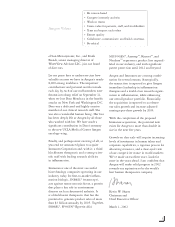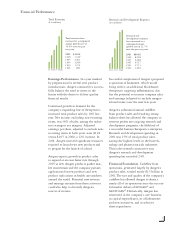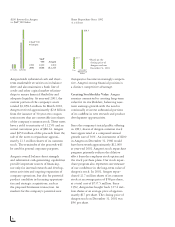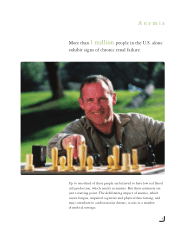Amgen 2001 Annual Report Download - page 17
Download and view the complete annual report
Please find page 17 of the 2001 Amgen annual report below. You can navigate through the pages in the report by either clicking on the pages listed below, or by using the keyword search tool below to find specific information within the annual report.
In early 2002, Amgen received U.S.
regulatory approval for Neulasta
™
(pegfilgrastim), Amgen’s new white blood
cell stimulator, in the chemotherapy
setting. Patients currently receive daily
injections of NEUPOGEN
®
following each
cycle of chemotherapy. Clinical trials
indicate that Neulasta
™
helps protect
against neutropenia using only a single
injection per cycle of chemotherapy.
Once-per-cycle dosing with Neulasta
™
will simplify the management of
chemotherapy-induced neutropenia,
potentially increasing the number of
patients capable of successfully complet-
ing a prescribed cycle of chemotherapy
without suffering neutropenic compli-
cations. In 2001, Amgen submitted
applications to the U.S., European,
Canadian, and Australian regulatory
authorities for approval to market
Neulasta
™
for use in support of myelo-
suppressive chemotherapy treatment.
Another side effect of cancer chemo-
therapy and radiotherapy is mucositis, a
painful ulceration of the mucosal lining
of the mouth and gastrointestinal tract.
This condition can produce mouth and
throat sores that prevent patients from
eating and may require pain medication.
Amgen’s keratinocyte growth factor (KGF)
is being investigated for the treatment of
oral mucositis. KGF is a recombinant form
of a naturally occurring human growth
factor that may stimulate the develop-
ment of mucosal cells. Amgen initiated
a phase 3 clinical trial of this product
candidate in 2001.
Looking beyond supportive cancer-care
treatments, Amgen has in recent years
broadened the reach of its oncology
research program. Amgen scientists now
actively pursue the discovery and develop-
ment of novel therapeutics capable of
targeting and eradicating tumor cells.
With substantial capabilities in a variety
of scientific approaches, Amgen research-
ers are studying small molecules and
human antibodies in addition to human
proteins and growth factors as potential
new therapeutics.
In 2000, Amgen licensed a novel cancer
therapeutic antibody, epratuzumab, from
Immunomedics, Inc. Amgen is evaluating
this antibody to determine if it is effective
in the treatment of non-Hodgkin’s lym-
phoma, a malignant condition character-
ized by abnormal cell development of
the lymphatic system. In 2001, Amgen
disclosed encouraging interim results
from a phase 2 clinical trial using
epratuzumab in combination with a com-
mercially available antibody, rituximab,
in the treatment of this disease.
Cancer
Amgen’s research and devel-
opment program in oncology
uses a variety of scientific
approaches in the pursuit of
novel therapeutics capable
of targeting and eradicating
tumor cells.
KGF, a potential therapeutic
for the treatment of oral
mucositis, advanced to a
phase 3 clinical trial in 2001.
15
























